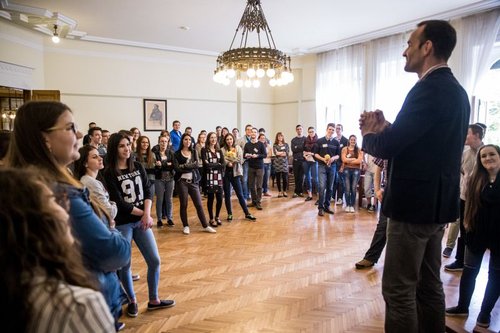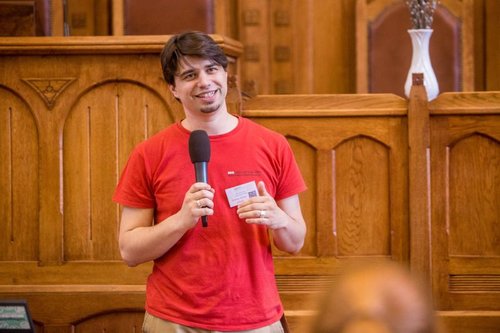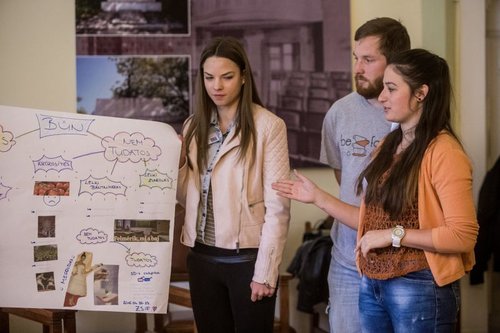
The main question
“Issues related to salvation, sin, and absolution did not exist only in the age of Reformation – they existed before the Reformation and they exist today,” said Szabolcs Szontágh, the Youth Officer of the RCH, during the Friday evening devotion when he spoke about the story of the rich man in Mark 10: 17-31. Every door was open for this rich young man, but he just wanted to know what he should do to get salvation. The young man wanted a specific action, whatever was the most important and would help him. Jesus stressed one important thing: because of his money, the young man felt himself capable of gaining salvation, but it was not so. In the Reformation, the only thing which intrigued the people was how to get to God. “Do we have prominent questions about our relationship with God, our everyday lives, or our environment that we want answers to?” asked the pastor.
Deeper desires
“Reading through the 95 theses, issues of salvation and deeper desires stood out: ‘I'm looking to meet God because I need him.’ There is a deep desire behind the questions. What drives us today? What do we want?” asked Viktor Katona, leader of the Soli Deo Gloria Youth Organization. “The reformers stood up for something and therefore they went against others. They found what is important to them. To stand up for something is important for us too, but we also need humility: others have worked for centuries for what we already have. Now we are looking for something that is missing from us, what drives us,” said the pastor about the task of to the Youth Assembly.
We need to dig deep

“Laying the foundation of something is very hard and long-term work,” said Katona, during a talk the next morning based on the story in Luke of a man who built upon a rock (Luke 6: 47-49). Viktor Katona added that the stability of the building depends on a solid foundation. Both people building are hearing the Word, but only one of them is actually doing what he hears. The one who is doing it well is building on the rock. “Do we allow the God’s message to go deep inside us and to find a place on solid foundation? Do we let God’s words remake us based on what we hear? If we let the Word to go deep, that will bring up our issues and desires. Calvin said it too, that if you know God, then self-knowledge will follow,” said the pastor.
Dialogue with the leadership of church
On Friday evening, the participants, led by Sándor Bányai, a trainer certified to lead experiential learning groups, formed teams that were based on their intelligence modalities. The young people were asked in advance to listen to the conversations, questions, and topics of interest between their classmates and peers in the days leading up to the Assembly and then they discussed what they heard in their small groups. The questions they had after this program were then drafted in a final declaration for the Synod. The task of the Youth Assembly, which was based on the Scottish model, is to formulate helpful messages for the Church leadership – one delegate from the Youth Assembly may observe the National Youth Assembly of the Church of Scotland during a summer. In the last year’s synod sessions, there was always an intense interest in the Youth Assembly’s final declaration.
Looking for an answer together

The following is an excerpt from this year’s declaration: “In 2016, we turn with trust to the Synod to share the questions which we and our contemporaries need guidance, collective thinking and teaching on.
Today our questions are: How we can live in the Church as young people? How can we make our communities more attractive for our peers? How could we address society consciously and in a well-prepared way? How do we define our Reformed identity? What can the Reformed Church say for the reality of our daily lives? We believe that our identity is based on the Word of God and our confessions, which guide us through our lives. We appeal to the Synod for assistance in interpreting confessions to make them more accessible and in offering answers for changes of today’s society and the spiritual challenges we face. We require actions bearing witness to the Gospel as reflected in the confessions, which we can share. In all of this, youth pastors and the efficient framework of their cooperation with others in the church have prominent roles.”
What do young people want? Perhaps we can say that they mostly desire acceptance – acceptance within the Church and also from the world and they want the word to accept their faith and their identity as believers.
The RCH Youth Assembly was established in 2012. This is a forum that gathers youth of the reformed faith to discuss questions relating to the church and the younger generation living in it.
In 2012 and 2013 the Youth Assembly declared that our confessions define our Reformed identity and this is why its translation into the vernacular of the youth must be prioritized in the church’s mission. The Youth Assembly declared that different spiritualties based on the Bible enrich our Church and do not weaken it. They gave recommendations on prejudices against the church, on the issue of credibility, taboo themes, and its answers to current ethical questions. Lastly, the Youth Assembly declared that authenticity can only be found in the life of the community. They expressed their gratitude that the assembly of the Synod paid special attention to the work of the Youth Assembly and were thankful for the chance to have a dialogue with them.
In 2014, the Youth Assembly also formulated recommendations on the work of the Church Revision Committee in the light of the youth mission. In 2015 the Youth Assembly discussed the theme of Trust and asked the leadership of the church to let the youth take bigger responsibility in every field of church life.
Written by Zsuzsanna Bagdán
Translated by Krisztina Fürjész
Photo: András Dimény